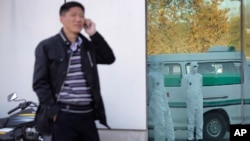Although the reported purge of North Korea’s defense chief and other high ranking officials may point to instability within the Kim Jong Un regime, the country’s economy has shown signs of improving. Under Kim Jong Un, the country has seen lower numbers of defectors trying to escape to the more prosperous South.
In the wake of the reported execution of North Korea’s Armed Forces Minister Hyon Yong Chol and three other high-ranking officials, there have been no outward signs of instability in the Kim Jong Un regime.
South Korea’s Defense Ministry says there has been no change in military readiness posture on either side of the border. North Korea did begin live-fire drills at sea near the border, but they conducted similar drills last year.
The country’s economy has also been improving, despite tough international sanctions imposed on Pyongyang for a variety of provocative actions, most importantly its continued development of nuclear weapons.
In 2014, the Hyundai Economic Research Institute in Seoul forecast that North Korea’s economy would grow by seven percent a year for 10 years. This may be overly optimistic but the country has experienced positive growth for the past three years.
And according to South Korea’s Unification Ministry the number of North Korean refugees entering South Korea dropped by more than 50 percent in 2009 to about 1,300 in 2014.
Part of the reason for this decline is that Pyongyang, during the tenure of Kim Jong Un, has increased the number of border guards and instituted harsher punishments for Koreans caught attempting to illegally cross the border. And because it is more difficult and dangerous to escape, it is also more expensive. It can cost thousands of dollars to pay smugglers and bribe border guards, to illegally cross over the border into China.
But Andrei Lankov, a professor of North Korea history at Kookmin University in Seoul, also credits the young supreme leader for taking a more practical approach to managing the economy to give more workers a financial incentive to operate within the system.
A case in point, he said, is the increase of legal migrant labor programs that send low wage North Korean workers to China, Russia and the Middle East. By allowing these laborers to work overseas, with the caveat that their families would be held accountable if they do not return, Professor Lankov said Kim Jong Un is giving workers a viable alternative to defecting.
“He understands that he cannot completely stop North Koreans especially from the border regions from running to China where their income is so much higher. So what he did he tried to introduce some control by essentially accepting this,” said Lankov.
Human rights groups, like the Seoul-based Database Center for North Korean Human Rights, describe the controls imposed by Pyongyang as inhumane treatment. These migrant workers often toil long hours under harsh conditions and have no legal rights or recourse. Their passports are confiscated and they are allowed to keep only a portion of the wages they earn.
Still, these are sought after jobs in North Korea, where workers in many state run operations do not get paid at all. And legal migrant laborers don’t put their families back home at risk of imprisonment, as do defectors who try to escape the repressive state.
Since the famine that struck North Korea in the late 1990s, when about one million people died of starvation, Pyongyang has slowly instituted some market-based reforms to the state run communist system to allow farmers to keep a portion of what they earn. Under Kim Jong Un some state owned enterprises have been given the latitude to operate essentially as private businesses.
Professor Lankov said the economic system now is a ruthless type of capitalism, rife with exploitation, but it is working.
“They are rewarded for the hard labor and they are punished for inefficiency. Because it is a very brutal type of capitalism there, really brutal. No social security. Nothing. If you don’t make money, you just starve to death,” he said.
Professor Lankov said North Korea’s apparent improved economic performance does not necessarily equate to increased stability within the Kim Jong Un regime. But he says it is important to note the country is not on the verge of starvation or economic collapse.
VOA Seoul Producer Youmi Kim contributed to this report.





